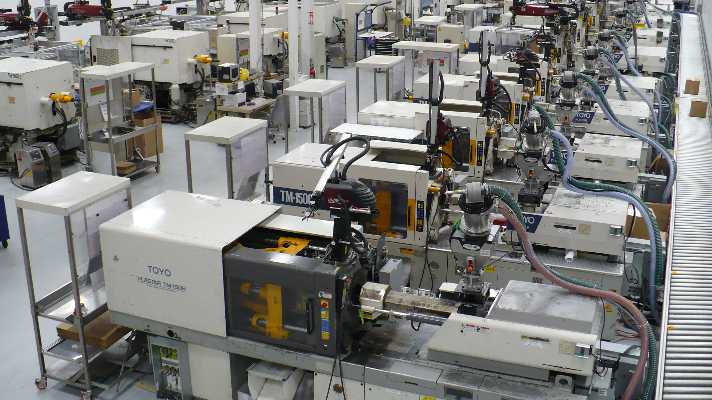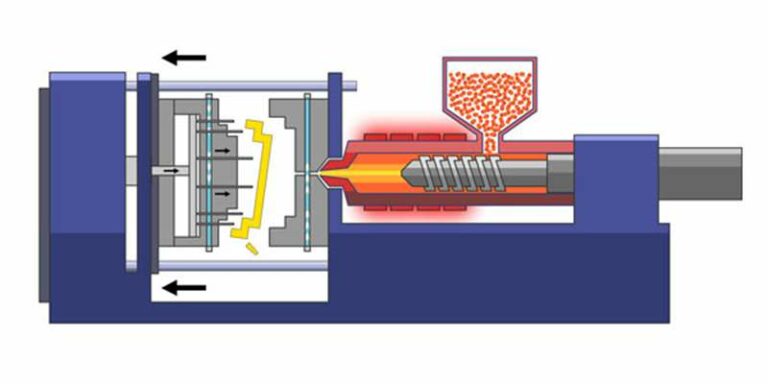The Future of Plastic Shot Molding: Trends and Developments to Watch
As the plastic injection molding market advances, numerous key trends are emerging that pledge to improve its landscape. Automation and clever production strategies are readied to enhance productivity, while the shift in the direction of lasting products mirrors an expanding ecological awareness. Furthermore, developments in 3D printing are leading the way for unmatched style versatility. These developments likewise bring forth challenges that require careful factor to consider. Recognizing exactly how these aspects will interact and affect future techniques is vital for stakeholders seeking to navigate this transformative period effectively.
Automation and Smart Production
As the plastic injection molding sector progresses, automation and smart production are taking center stage, revolutionizing manufacturing processes - Plastic Injection Molding. The assimilation of sophisticated technologies such as robotics, IoT (Net of Things), and artificial knowledge is enabling makers to enhance performance, decrease functional costs, and boost product top quality. Automated systems improve operations, reducing hand-operated intervention and boosting throughput, which is important in fulfilling the increasing need for rapid manufacturing cycles
Smart making innovations promote real-time monitoring and information evaluation, allowing business to optimize device efficiency and predict maintenance requirements. This aggressive method not just decreases downtime but likewise expands the lifespan of devices. In addition, making use of collective robotics, or cobots, boosts the flexibility of assembly line, allowing workers and devices to run side by side safely and effectively.
The adoption of automation in plastic injection molding is not merely a trend yet a calculated vital for services aiming to stay competitive in an international market. By harnessing these innovations, producers can attain greater accuracy, lower waste, and adjust promptly to transforming client needs, positioning themselves for sustainable growth in an increasingly automated future.
Lasting Products and Practices
The press towards automation and wise manufacturing has led the means for a better focus on sustainable materials and techniques within the plastic shot molding market. Business are progressively seeking eco-friendly alternatives to typical petroleum-based plastics, bring about the fostering of bio-based and recycled products. These lasting materials not just lower environmental impact yet additionally line up with consumer need for greener products.

Moreover, cooperation in between suppliers, product distributors, and ecological companies is cultivating technology in the growth of lasting products that satisfy performance standards without compromising quality. As regulations around plastic usage come to be more stringent, the sector is positioned to adapt by embracing these sustainable approaches, making certain lasting feasibility and minimizing reliance on non-renewable resources. The assimilation of sustainability right into plastic injection molding is not merely a trend; it is coming to be a crucial element of business responsibility and functional quality.
Advancements in 3D Printing
Recent innovations in 3D printing innovation are substantially changing the landscape of plastic injection molding. The integration of additive production procedures permits the quick prototyping of complicated geometries that were once tough or impossible to accomplish through typical techniques - Plastic Injection Molding. This capability not just accelerates item development cycles however also minimizes material waste, lining up with the expanding demand for lasting manufacturing methods
Moreover, the introduction of crossbreed manufacturing strategies, which combine 3D printing and injection molding, supplies manufacturers the capability to develop elaborate layouts while maintaining the effectiveness of mass manufacturing. This approach allows the manufacturing of tailored parts tailored to certain customer requirements without compromising the rate and scalability that shot molding provides.
Furthermore, improvements in products, such as high-performance polymers and composites specifically developed for 3D printing, are boosting the useful capabilities of printed components. These materials can stand up to better stress and exhibit improved thermal residential properties, making them ideal for even more requiring applications.
As 3D printing proceeds to evolve, its integration into plastic injection molding processes promises to enhance efficiency, decrease expenses, and foster advancement in item style, positioning makers to better satisfy the difficulties of an open market.
Data Analytics and IoT Integration
Data analytics and the integration of the Internet of Points (IoT) are changing plastic shot molding by giving suppliers with extraordinary understandings into their operations. By leveraging real-time data accumulated from interconnected equipments and sensing go to this web-site units, suppliers can keep an eye on performance metrics, identify inefficiencies, and maximize manufacturing processes. This data-driven method facilitates anticipating upkeep, minimizing downtime and extending equipment life-span.
Moreover, IoT combination allows for boosted high quality control. By constantly tracking variables such as stress, cycle, and temperature times, producers can promptly find discrepancies from established specifications and make adjustments in actual time. This not only boosts product uniformity however additionally minimizes waste and scrap rates.
The blend of data analytics and IoT modern technologies also encourages manufacturers to take on more active production methods. With accessibility to thorough data analytics, companies can reply to market needs with better versatility, more information readjusting production routines and arrangements as needed. This versatility is essential in a quickly transforming manufacturing landscape.

Customization and Design Flexibility
Exactly how can customization and design adaptability improve the competitiveness of plastic shot molding? Personalization allows suppliers to satisfy specific customer needs, suiting special dimensions, forms, and functionalities that standard items may not meet.
Developments in layout innovations, such as computer-aided design (CAD) and fast prototyping, further boost this trend. These devices enable developers to create complicated geometries and intricate patterns, which can be effortlessly integrated into the manufacturing process. As an outcome, manufacturers can react promptly to altering customer preferences and market demands.
In addition, the implementation of modular tooling systems improves layout flexibility, permitting for quicker changes between various item designs without substantial downtime. This flexibility can result in visit this site right here minimized preparations and lower production expenses, making firms more nimble and affordable. Eventually, accepting modification and design flexibility in plastic injection molding not only raises item offerings yet also strengthens market positioning in an ever-evolving landscape.
Final Thought
The future of plastic shot molding is defined by considerable developments in automation, sustainable techniques, and cutting-edge products. Personalization through modular tooling and quick prototyping will enable suppliers to continue to be responsive and affordable to the dynamic demands of the market.

The future of plastic shot molding is identified by substantial advancements in automation, sustainable methods, and ingenious products.
Comments on “How Plastic Injection Molding Drives Efficiency in Mass Production”